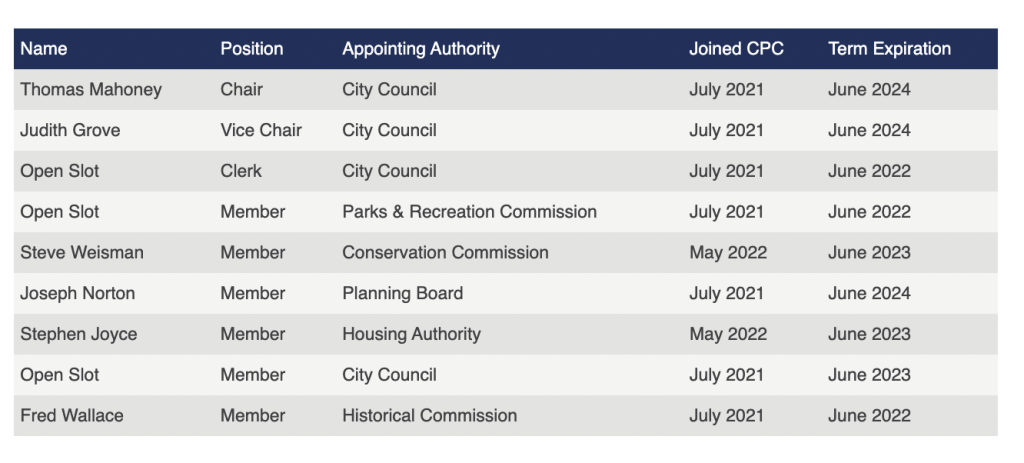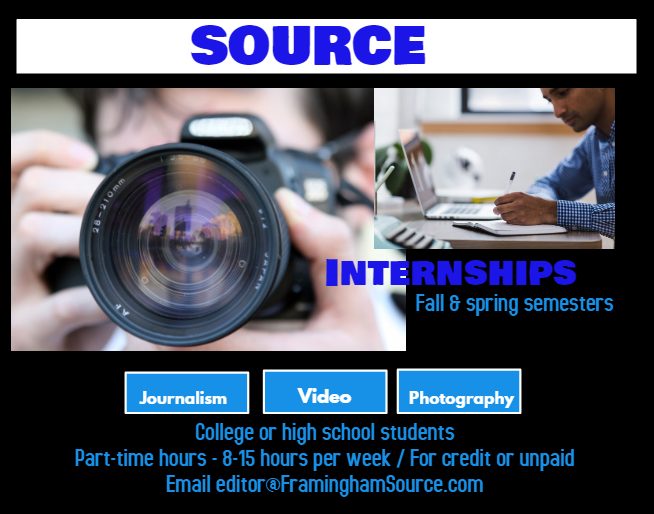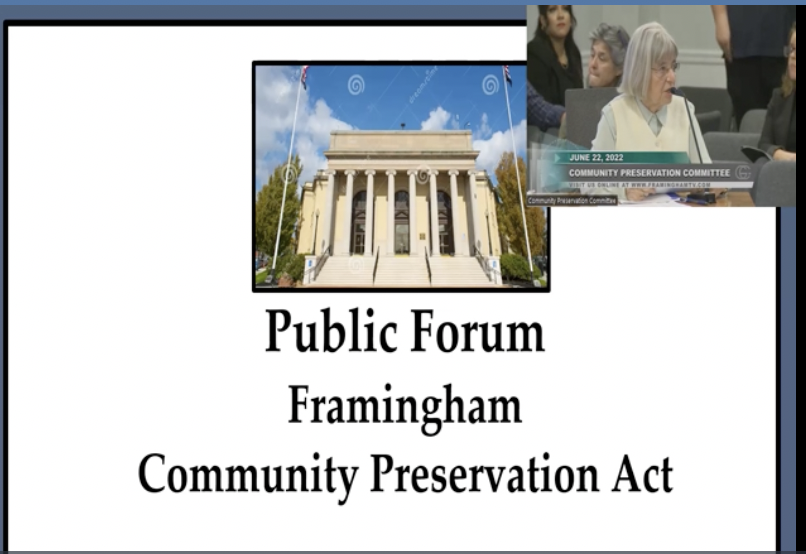By Jack Landsiedel
***
[broadstreet zone=”59982″]
FRAMINGHAM – The Framingham Community Preservation Committee (CPC) hosted a public forum on Wednesday, June 22 at City Hall.
Residents were asked to provide feedback on the draft Community Preservation Plan (CPP) for FY2023 which begins on July 1, 2022.
The Committee is responsible for evaluating the community preservation needs of Framingham and making recommendations for appropriations from the Community Preservation Fund (CPC Fund) to the City Council as part of the annual budget process. To learn more about the Committee, click here.
There are openings on the Committee, after three people resigned in June.

In the first part of the public hearing, Community Preservation Committee Vice Chair Judith Grove provided an overview of the committee’s structure, responsibilities, and schedule.
The Community Preservation Act (CPA) is a Massachusetts State Law. Votes in Framingham adopted it on November 3, 2020. The Act allows municipalities to raise funds to create, preserve, and support open space, historic sites, outdoor recreation, and affordable housing.
In Framingham, the Act is funded by a 1% surcharge on local property tax, amounting to $1.6 million so far this year. In future years, the fund will receive a 35% match from the state.
[broadstreet zone=”59983″]
The Framingham Community Preservation Committee budget requires 10% spending each on 1) open space and outdoor recreation, 2) historic, and 3) community housing needs. This is in addition to 5% spending on administration and 65% flexible spending on the three previous categories.
The Committee was established in July 2021 with nine volunteer members to develop the Community Preservation Plan, hold public hearings, and recommend projects to the City Council. Its mission is to “uphold a process that is accessible, ethical, transparent, and represents the diverse geographic and demographic of Framingham.”
Projects must be consistent with the Plan and its criteria, as well as serve the community.
The final approval of funding will be determined with a majority vote of the City Council.
The process of applications and pertinent due dates are as follows.
- July 15, 2022: Pre-qualification available and after approval by Community Preservation Committee (CPC)
- August 1, 2022: Applicant may submit the Full Application
- September 8, 2022: Deadline to file Pre-qualification Application
- October 15, 2022: Deadline to file Full Application
- Oct–Dec, 2022: Committee holds hearings, reviews projects, gives feedback
- December 2022: Community Preservation Committee ranks and shortlists projects
- January 2023: Community Preservation Committee votes on projects to send to City Council
- By February 1, 2023: Community Preservation Committee recommends a list of projects to City Council
[broadstreet zone=”58610″]
Examples of projects can be found below.
- Open Space
- Pursue plans for the Bruce Freeman Trail, Chris Walsh Trail, Bay Circuit Trail, and others
- Create new community gardens
- Improve pocket parks throughout Framingham
- Ensure ADA compliance at recreational facilities
- Historic Preservation
- Renovate/restore Village Hall, Atheneum Hall, and Edgell Memorial Library
- Curate Framingham’s oldest documents and artifacts
- Involvement with the MCI property if the state decides to sell
- Grants to NPOs owning historic properties under eligibility guidelines
- Community Housing
- Create first-floor and accessible housing units for mobility-impaired residents
- Create subsidized units
- Create extremely low income (ELI) units
- Establish housing proximity to dense employment areas and public transportation
[broadstreet zone=”59984″]
In the second part of the meeting, residents were invited to ask questions and discuss opportunities for the Community Preservation Plan (CPP) in the above categories. Their ideas and concerns can be found below.
Former Fair Housing Committee Chair Hank Moran told the committee about the “difficult challenge trying to understand the various roles of the various departments that are involved with housing” and recommended the City compare any planned funding to existing plans to “develop a consistency within the community.” The committee responded that future housing opportunities could be developed with “seed money from the CPC” but will require collaboration across city government.
“It’s so important that we have an updated housing plan for Framingham with updated data so that we really can focus in on what our needs are,” Karen Margolis relayed, noting that data “is probably fifteen years old.” “A big issue is that affordable housing just isn’t affordable” and “really doesn’t meet the needs of people that live in our community.”
“As Chair of the Framingham School Committee, I encourage […] you to support and promote projects that […] bring our children outside,” Priscila Sousa recommended, seeking to “mitigate the lingering effects the pandemic has had” on mental health. “The neighborhoods in South Framingham need more open space. I strongly urge the CPC to select projects in these neighborhoods, especially around the environmental justice sites.”
[broadstreet zone=”53130″]
“The district in our community with the least amount of public open space is actually the one that I’m privileged to represent, District 4,” City Councilor Mike Cannon told the CPC. “We have, other than Simpson Park, no public parks,” which is currently difficult to access. But, he is optimistic that “there are opportunities to increase parking” and make the park “[ADA] accessible for the entire community” with a “limited, reasonable investment.”
Central Street resident Ron Chick emphasized that there are two Simpson Parks. The Simpson Drive Simpson Park is an “underdeveloped and underutilized parcel” with a “trail and a walkway that goes down to the Sudbury River.” On Central Street, he said “there’s potential matching funding for an ADA dock on the Sudbury River” through a local non-profit.
Chick also updated the CPC on trail initiatives, including submitted designs for the Bruce Freeman and Carol Getchell Trails. “The [Saxonville] Levy Trail is between Concord Street and Danforth Street. It would connect the Cochituate Rail Trail to the Carole Getchell Trail” and link Natick and Framingham residents if plans are completed. He also suggested that “there’s great potential to connect the Chris Walsh Trail to South Framingham by connecting the Upper Charles Trail from Milford. […] It may be a good time for the City to reach out to the new owners of the [Adesa] property” to establish trail connections to MCI and the Sudbury Aqueduct.
[broadstreet zone=”59947″]
Resident Mary Memmott “volunteer[s] with a group called Transition Framingham, transitioning Framingham from fossil fuel dependence to local resilience.” She told the committee “we really would like to bring forward community gardens” and asked for technical help on proposals. CPC Vice Chair Judith Grove suggested that all applications start with the pre-qualification form and find similar projects in other communities to get started.
Annette Barnett addressed Nobscot neighbors’ concerns over a flood zone near Garden in the Woods. “We’re stuck with this flood damage that’s going to get much worse and we don’t have the ability to fix it.” Through the completion of the Bruce Freeman Rail Trail, Barnett believes “it’s the only way that [..] the City’s going to be able to acquire that land” and mitigate future issues. The committee indicated that a feasibility study for safety improvements could be an appropriate use of CPA funding.
“What I would really like to encourage this entire community to do […] is to think outside the box with these projects,” Pheasant Hill resident Mary Kate Feeney said at the conclusion of the meeting. “How can we also not just connect to other communities, but within our own community as well?”
“A big part of Framingham is not here,” resident Bill Lynch told the CPC, also noticing three vacancies on the committee. “The second paragraph of the charter for this commission says specifically the committee members shall be Framingham residents and the committee’s composition shall reflect the demographic and geographic diversity of the City. That’s not happening with the members we have”

“I would urge you to go to the City Council and go to the Mayor and let them know you’re not going to spend a dollar, not one penny, until the diversity and representation of Framingham are actually making decisions on how to spend our tax money,” Lynch stated.
To watch the full public hearing, click here.
For answers to questions or to find more information on how to submit applications, residents can visit the CPC’s page on the City website or contact the committee directly at CPC@framinghamma.gov.
***
Jack Landsiedel is a Framingham resident and graduate of Stapleton Elementary School, Christa McAuliffe Charter School, and Framingham High School (Class of 2020). He is a rising senior at the University of Maryland, College Park where he is majoring in Government & Politics with a minor in International Development & Conflict Management. He is looking forward to studying abroad at Queen Mary University of London this fall and exploring nearby countries. In the future, he hopes to pursue a career in Washington D.C. involving policy, leadership, and sustainability. This summer, he is a SOURCE intern covering government & politics.


